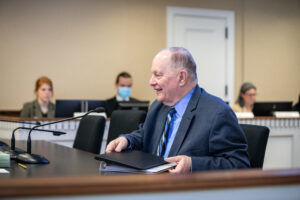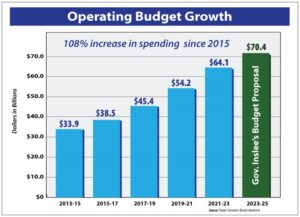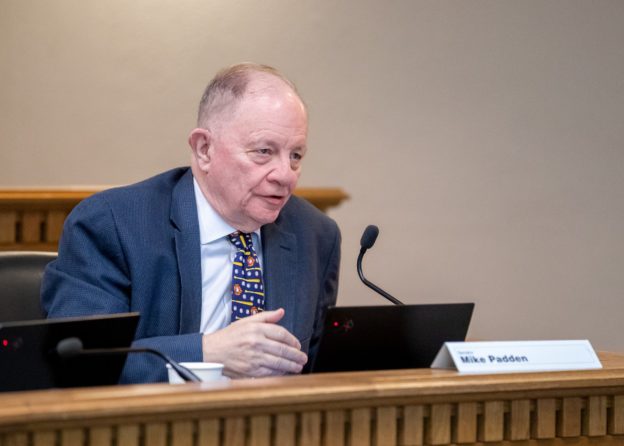Note: The following e-newsletter was sent to Sen. Padden’s subscribers March 10, 2023. To subscribe to Sen. Padden’s newsletter, click here.
The Senate just passed a milestone for the 2023 legislative session. Wednesday was the “floor cutoff,” the last day for the Senate to vote on Senate bills, except measures that are considered necessary for the upcoming state operating, capital and transportation budgets.
With the “floor cutoff” behind us, the Senate has returned its focus to committee meetings, this time to hold public hearings on bills passed by the House. Meanwhile, House committees are holding public hearings on legislation approved by the Senate. The 105-day legislative session is scheduled to end April 23.
During the final days before the floor cutoff, the Senate passed two bills that try to address significant public safety issues. However, both measures failed to significantly improve public safety.

The first of these two measures is Senate Bill 5536. This proposal is the latest attempt to address a problem created by a controversial ruling by our state Supreme Court two years ago.
On February 25, 2021, the Supreme Court in State v. Blake ruled Washington’s felony drug-possession statute was unconstitutional because it criminalized possession even when a person did not knowingly have drugs.
The Blake ruling basically decriminalized drug possession or drug use. As you can guess, this decision by the Supreme Court caught the Legislature’s attention two years ago. Two months after the Blake ruling, the Democrat majorities in the 2021 Legislature passed Senate Bill 5476. Every Senate Republican opposed the bill on final passage, along with a couple of Democrats. This law reduced the criminal penalty for possessing an illegal drug like fentanyl, heroin and methamphetamine from a felony to a misdemeanor. The language in the legislation prevented even the misdemeanor from being prosecuted.
The action taken by the Legislature two years ago in response to Blake did not work. Plus, the law created by SB 5476 expires this year, so the Legislature needs to take new action on drug possession this session or hard drugs will be legal rather than just effectively legal.
Last Friday night, the Senate voted 28-21 to pass Senate Bill 5536, which aims to provide a solution to the state’s drug laws after the Blake ruling. The bill declares that possession of fentanyl, cocaine, heroin and methamphetamine would be charged as a gross misdemeanor after three diversions.
I was among the 21 senators (some were Republicans, others were Democrats) who voted against the proposal. This bill does not go far enough to provide the leverage needed to help people get off dangerous drugs. It’s disappointing that the Senate did not restore making possession of fentanyl and other hard drugs a felony, as it was before the Supreme Court upended our state’s drug laws in the Blake decision two years ago. The threat of a longer sentence is a needed motivation for drug offenders to undergo treatment. We need a balance between accountability and treatment that this legislation doesn’t achieve.
In recent years, our state has endured a startling increase in drug-overdose deaths, and two-thirds of these deaths involve fentanyl. Law enforcement in our state has pointed out the importance of tougher penalties for drug possession in order to incentivize drug users to get the treatment they need to hopefully become clean. I’m concerned that we are missing the chance to create a true ‘carrot-and-stick’ approach to combat drug use in Washington.
While Senate Bill 5536 is an improvement over the inadequate drug-possession law passed in 2021, it does not go far enough to make meaningful and needed changes to our state’s drug laws.
SB 5536 now goes to the House of Representatives for further consideration.
The second public safety measure passed by the Senate that I opposed is Senate Bill 5352, a proposal that deals with vehicle pursuits of suspects by law-enforcement officers. The Senate passed SB 5352 on a 26-23 vote. There were 16 Democrats and 10 Republicans who voted for it, while 13 Democrats and 10 Republicans voted against it.
SB 5352 fails to sufficiently fix the problem created two years ago. It is, however, a vehicle for the Legislature to address the inability of law enforcement to pursue criminals.
The Democratic majorities in the Legislature changed state law in 2021 to limit the ability of officers to pursue suspects. Before the change, officers needed “reasonable suspicion” to initiate a vehicle pursuit of suspects. The new law only allows such vehicle pursuits based on “probable cause.” As a result, officers have been forced to watch criminals drive off. It also has emboldened criminals to commit other crimes and victimize others and resulted in a loss of lives.
According to the Washington State Patrol, between 2014 and 2020 an average of 1,200 suspects per year fled from police. In 2022, after the pursuit standard was changed to probable cause, 3,100 suspects fled — an increase of more than 150%. Before the change in this law, the statewide record for stolen cars in a single year was 30,000. That climbed to nearly 47,000 stolen vehicles in 2022.
Under SB 5352 as approved by the Senate Wednesday, a vehicle pursuit can occur if there is reasonable suspicion, but only for suspicion of violent offenses, sex offenses, vehicular assault offenses, assault in the first-to-fourth degree involving domestic violence, an escape or a driving-under-the-influence offense.

During floor debate on the measure, I offered a floor amendment that would have permitted an officer to engage in a vehicle pursuit if the officer has reasonable suspicion a person inside the vehicle has committed or is committing theft of a motor vehicle. We are fourth in the U.S. for auto thefts per capita. The amendment was defeated along party lines 29-20.
This newsletter covers other issues and events happening in Olympia in this past week.
If you have questions about how to participate in state government this year or thoughts to share on anything in this e-newsletter, please give me a call or send me an email.
Thank you, as always, for the honor of serving as your state senator!
Best Regards,

Senator Mike Padden
Senate passes ‘DUI lookback’ bill for third straight year

For third year in a row, the Senate has passed legislation of mine that aims to decrease impaired driving.
Senate Bill 5032 , which was approved 48-1 on Wednesday, would expand the period for reviewing prior convictions of impaired driving to 15 years, from the 10 years now in state law, when determining whether a new offense of impaired driving is charged as a felony. The proposal would increase the penalty from a gross misdemeanor to a felony offense for any person who has three or more prior DUI offenses within that “lookback” period.
Our state has seen an alarming increase in traffic deaths over the past few years, and drunk driving and drug-impaired driving are two leading causes.
The Washington Traffic Safety Commission reported that road deaths in our state reached a 20-year high in 2021. There were 670 traffic deaths in 2021, including 272 fatalities involving drug-impaired driving and 155 deaths involving alcohol-impaired driving. In 2020, Washington had 574 traffic fatalities, including 214 involving drug-impaired driving and 135 involving alcohol-impaired driving.
The commission has a current preliminary estimate of 745 traffic fatalities in 2022. No 2022 figures on traffic deaths involving drug- or alcohol-impaired driving are available yet.
This bill would help get the most dangerous drivers off the road and into treatment. Our state has seen too many accidents and fatalities caused by drunk and drug-impaired drivers, especially repeat offenders. This bill could help reverse this tragic trend.
Many traffic fatalities in the state involve drivers who have had as many as eight DUI offenses, but the current 10-year lookback period is not long enough to allow the state to impose stronger punishment against such offenders.
Repeat impaired-driving offenders commit most of the vehicular homicides and vehicular assaults in Washington. This is a bill to try to prevent those horrible, senseless crimes.
SB 5032 would give offenders a chance to undergo a highly structured treatment program.
SB 5032 now goes to the House of Representatives for more consideration.
A similar proposal that I introduced, Senate Bill 5054, was passed by the Senate during the 2021 and 2022 legislative sessions, including unanimous approval last year. The bill later died in the House both years.
Custodial sexual misconduct bill receives House hearing

Sen. Padden talks to members of the House Community Safety, Justice and Reentry Committee during his testimony on Senate Bill 5033.
Senate Bill 5033, a bipartisan measure that I introduced that would impose longer sentences on sexually abusive jail and prison guards, received a public hearing yesterday in the House Community Safety, Justice and Reentry Committee.
This proposal would reclassify the crime of first-degree custodial sexual misconduct as a Class B felony, allowing a prison term of 10 years instead of the current five-year maximum.
Officers who work in our state’s correctional facilities are part of the law-enforcement community. Like all the other officers who serve the public, corrections officers must be held to a high standard, especially when you consider the unique level of authority they have over people in custody. Senate Bill 5033 would increase the punishment for corrections officers who sexually assault or abuse inmates in the course of their jobs.
The bill was inspired by a KING-TV investigation about a Clallam County jail guard, John Gray, who was convicted in 2021 of two felony and two misdemeanor counts of custodial sexual misconduct and served 13 months of his 20-month sentence.
Just as she did when SB 5033 received a hearing in the Senate Law and Justice Committee earlier this session, Dawn Reid testified in favor of the proposal during its House hearing. Reid is the mother of Kimberly Bender, a 23-year-old Quileute woman who died by suicide in her Forks jail cell in 2019 after reporting to city officials that Gray harassed her.
March 29 is the last day for House policy committees to pass Senate bills.
Chart reveals operating budget growth

As Democratic budget writers prepare to unveil a two-year state operating budget proposal in a few weeks, it is worth seeing how much the operating budget has grown in recent years. As this chart shows, the budget has experienced a 108% spending increase since 2015 if you factor in Governor Inslee’s $70.4 billion proposed budget.
Contact us!
If you have a question or concern about state government, please do not hesitate to contact our office. During the session we are conducting business from our Senate office in Olympia. We are here to serve you!
Phone: (360) 786-7606
Olympia Office: 215 Legislative Modular Building, Olympia, WA 98504-0404
Email address: Mike.Padden@leg.wa.gov
PLEASE NOTE: Any email or documents you provide to this office may be subject to disclosure under RCW 42.56. If you would prefer to communicate by phone, please contact Sen. Padden’s Olympia office at (360) 786-7606.
To request public records from Sen. Padden, please contact Randi Stratton, the designated public records officer for the Secretary of the Senate and Senate members.























